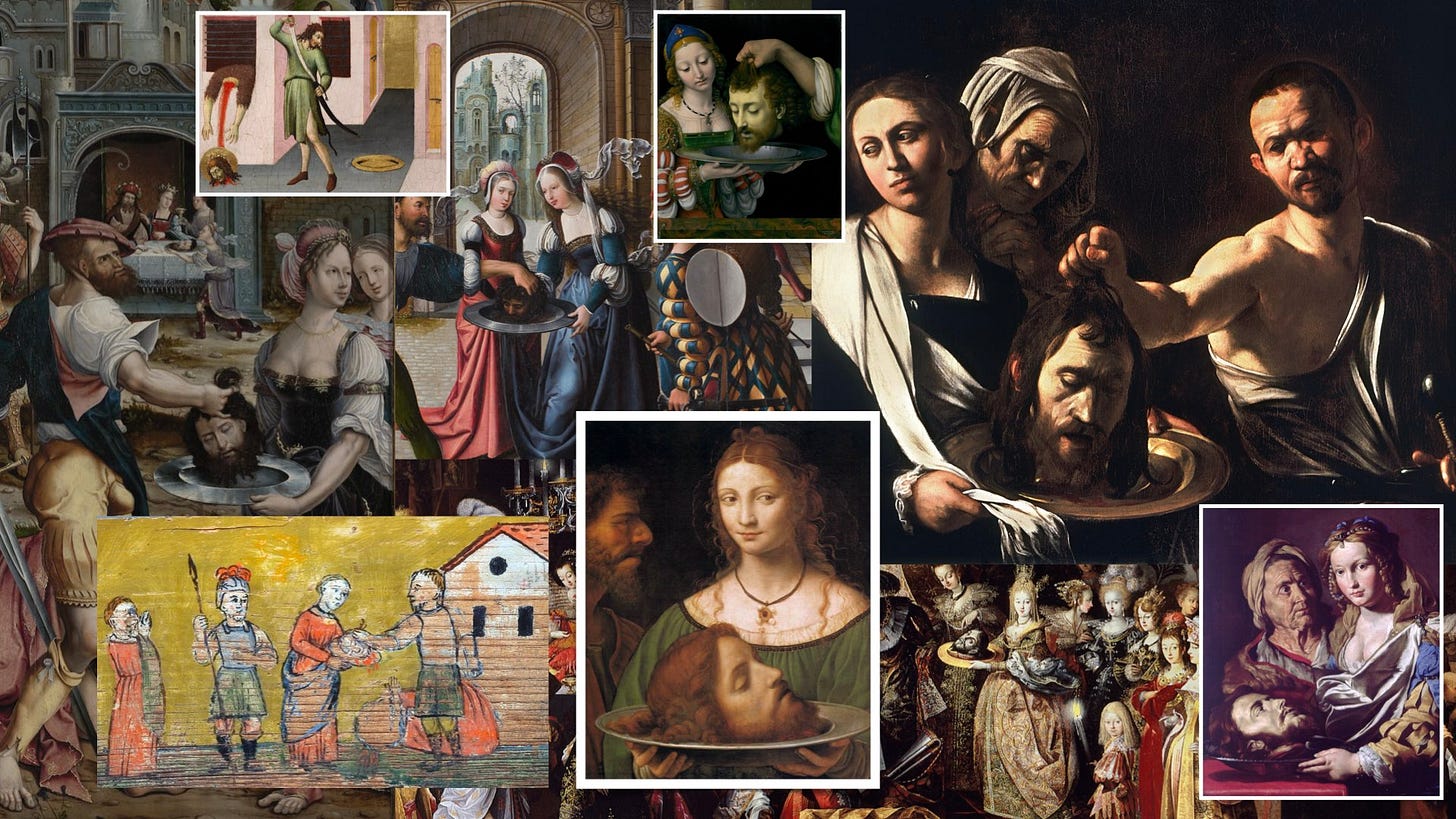Head on a Platter
The cost and power of fearless words
John the Baptist is a rarity in the liturgical calendar, with more than one feast day attached to him. His birth is celebrated on 24th June. And on 29th August, the Church of England remembers his death by beheading.
There is no shortage of images of this grisly story in the canon of Western Art (see above). Painting the head of John the Baptist almost seems like a rite of passage for any self-respecting Renaissance artist. It was a popular choice not just because it is so shocking to see a head on a platter, but because the scene is highly charged with drama. The death of John the Baptist isn’t merely a cruel thoughtless act by a wicked tyrant. It is the result of intrigue that can be represented on a canvas with all kinds of looks, glances and symbols. Good pictures aren’t merely those that capture a moment, or faithfully represent reality. They tell a deeper story. What is the story of the beheading of John the Baptist?
In Mark’s gospel, we find John the Baptist at the very start preaching and baptising people, proclaiming the need to repent, and pointing to another who was to come. “And immediately” as Mark likes to say in his breathless narrative, we see Jesus submit to John for baptism, as he will eventually submit to death on a cross. At the moment of death, the temple curtain tears in two (ἐσχίσθη). As John baptises Jesus, the heavens themselves are torn open (same Greek verb: σχιζομένους) and the Spirit descends like a dove as a voice from heaven proclaims favour on his Son.
John the Baptist had acquired his own followers and Jesus waits until John stopped his ministry before he begins his own so there is no rivalry between their followers. The reason for John stopping ministry is given in Mark 1:14: “Now after John was arrested…” and we hear no more about this until Mark 6 when we are given a flashback.
King Herod heard this, for his name had become known, and he said, “John the Baptist has risen from the dead, and therefore these powers are at work in him.” But others said, “He is Elijah.” Others said, “He is a prophet, or like one of the prophets.”
But Herod, when he heard this, said, “This is John, whom I beheaded. He has risen from the dead.” For Herod himself had sent out and arrested John and bound him in prison for the sake of Herodias, his brother Philip’s wife, for he had married her. For John had said to Herod, “It is not lawful for you to have your brother’s wife.”
Herodias set herself against him and desired to kill him, but she couldn’t, for Herod feared John, knowing that he was a righteous and holy man, and kept him safe. When he heard him, he did many things, and he heard him gladly. (Mark 6:14-20)
John’s fame and his following had made him a target. He had condemned Herod’s latest marriage to Herodias, his brother’s wife, so it was only a matter of time before the troops came and threw him in jail. Herodias must have been thrilled. Sooner or later, her husband’s propensity for cruelty and violence would lead to John’s death.
But it did not. Herod was mesmerised by John’s teaching. He kept him safe – or at least as safe as you can be in one of Herod’s prisons. John is like a prophetic pet for Herod, kept in a cage and visited from time to time. Had the King turned up to gloat over John whilst twirling his moustache and stroking a cat? Far from it. Herod was visiting his conscience. He knew John “was a righteous and holy man, and kept him safe… and heard him gladly.” John’s preaching had power that drew in Herod.
We see a powerful tyrant and a man in a cage, and we assume how the power works. But words have power, especially God’s word. Herod held all the aces and the trump cards. John the Baptist had no way out. But Herod could not bring himself to snuff out the life of John the Baptist as his wife wanted.
There was hope for Herod. Even his stone-cold heart could have been melted by the words of John the Baptist, causing him to repent and follow the true King of Kings, the Lord Jesus Christ. It was not the miraculous ministry of Jesus that grabbed Herod’s heart. It was not even the miraculous ministry of Jesus’s servants who have just been sent out to drive out demons and heal the sick by anointing them with oil earlier in Mark 6. Herod hears about that later – and this story about John’s death is inserted in the narrative to explain the fate of John the Baptist.
Herod had been captured by the words of Jesus’s humble baptiser, John. Let us not underestimate the power of words. We often hold back, assuming we know what the result will be. We think they will be unheeded, make no difference or, worse, land us in jail. We are beginning to see that in this country you can say certain true things in certain places and receive a visit from the police and be thrown in jail, like John.
There are also true things you can say to members of your family or close friends that you feel may isolate you, or cause damage that seems irreparable. But perhaps the truth needs to be said anyway. We do not know the outcome of our words. Let us not prejudge it but speak the truth as we have been commanded to.
This includes proclaiming the Lordship of Christ, calling those who disobey to account and warning them that their actions have been noticed and noted by God. We must also proclaim that these sins can be washed away and struck from the record by his Son, Jesus Christ, if they will only repent and submit to his rule.
But the clock is ticking. You cannot keep the teaching of Jesus in a cage. Sooner or later, it must be unleashed or extinguished. Herodias was concerned by this unhealthy fascination with John’s words. John may persuade Herod to have her executed for leading him astray, reminiscent of Henry VIII’s vicious spurning of Anne Boleyn.
So Herodias had to pull off a trick in order to shame and embarrass Herod into executing the one who denounced her marriage.
Then a convenient day came when Herod on his birthday made a supper for his nobles, the high officers, and the chief men of Galilee. When the daughter of Herodias herself came in and danced, she pleased Herod and those sitting with him. The king said to the young lady, “Ask me whatever you want, and I will give it to you.” He swore to her, “Whatever you ask of me, I will give you, up to half of my kingdom.”
She went out and said to her mother, “What shall I ask?”
She said, “The head of John the Baptizer.”
She came in immediately with haste to the king and requested, “I want you to give me right now the head of John the Baptizer on a platter.”
The king was exceedingly sorry, but for the sake of his oaths and of his dinner guests, he didn’t wish to refuse her. Immediately the king sent out a soldier of his guard and commanded to bring John’s head; and he went and beheaded him in the prison, and brought his head on a platter, and gave it to the young lady; and the young lady gave it to her mother.
In a scene reminiscent of Esther 5:3 when Xerxes offers his bride up to half his kingdom, Herod offers Salome the same and, as other gospel writers explain, the girl has been primed to ask for the head of John the Baptist. Herod has been snookered. In this public setting, he is unable to defend a public enemy to his throne and reluctantly orders his execution. He had been rash with his words and promises which had greater power than he realised at the time. We must weigh our words or we will be weighed according to them.
Enjoyed that? Do you subscribe? Why not? It’s free and every Friday:
Speaking of words, I have a new podcast that launches on Monday. It is the Stand-Up Theologian podcast which is, I hope, a witty and thought-provoking blend of comedy, theology, and cultural insight that will be of interest to anyone curious about the Bible and the Church. I speak to self-styled “reformed mythologist” Nate Morgan-Locke who unpacks the power of story—from Back to the Future to Star Wars—and we explore why sitcoms like Fawlty Towers, Friends and The Office resonate in a very different way from movies, leaving us asking if we’re living in a movie or a sitcom.
Subscribe today and hear the episode when it drops first thing Monday. Or get it today by becoming a Loyal Lollard over at The Wycliffe Papers where every episode of Season 1 will arrive early.
You will also get many other benefits as a Loyal Lollard, including a monthly Zoom chat with me, the next one being TONIGHT if you read this on the day that it drops. We’ll be thinking about the joy of funny songs (partly following the recent death of Tom Lehrer). Plus you get to rate and review the jokes that appear on the Wycliffe Papers every Thursday lunchtime and access to lots of other bonuses – and the satisfaction of being a patron of the arts like a Medici.
Get access to all these benefits by joining via a Wycliffe Weekender post like this one:






Monty Python: "I'd like to see John The Baptist's impersonation of Graham Hill."